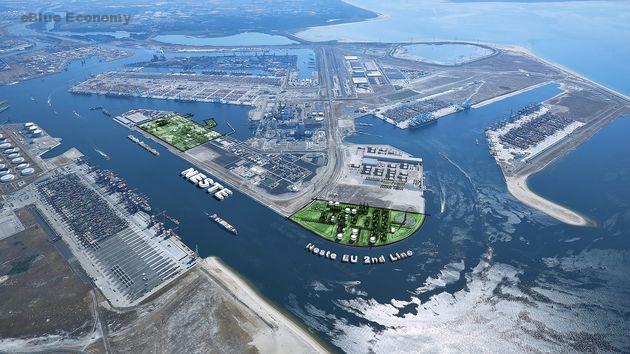Air Products and Gunvor cooperate on Green Hydrogen Import Terminal in Rotterdam
Neste Corporation has made the final investment decision to invest in new renewable products production capacity in Rotterdam. The decision is based on demand for renewable products growing substantially with customers’ higher climate ambitions.
Neste’s current 1.4 million ton capacity for renewable products in Rotterdam is the largest in Europe. The Rotterdam refinery expansion investment of approximately EUR 1.9 billion will expand Neste’s overall renewable product capacity by 1.3 million tons per annum, bringing the total renewable product capacity in Rotterdam to 2.7 million tons annually, of which sustainable aviation fuel (SAF) production capability will be 1.2 million tons. The company’s target is to start up the new production unit during the first half of 2026.
Neste currently has a renewable products global production capacity of 3.3 million tons annually. Neste’s ongoing Singapore expansion project and the joint venture with Marathon in Martinez, CA, which is still pending closing, will increase the total production capacity of renewable products to 5.5 million tons by the end of 2023, and make Neste the only global provider of renewable fuels and renewable feedstock for polymers and chemicals with a production footprint on three continents.
When completed, the Rotterdam expansion project will further increase the company’s total production capacity of renewable products to 6.8 million tons by the end of 2026.

On the other hand, Air Products and Gunvor Petroleum Rotterdam have signed a joint development agreement for an import terminal in Rotterdam. The agreement responds to the accelerating demand for green energy sources to meet climate objectives and the need to diversify energy sources. The import terminal is expected to provide green hydrogen to the Netherlands in 2026.
Key development milestones
The signing of the agreement is an important step toward an investment decision that will be taken as the companies gain confidence in the regulatory framework, permitting process, and funding support.
Certification of the green hydrogen is needed to ensure that the imported green ammonia and resulting green hydrogen are recognized and counted towards the EU renewable energy targets. For funding support, this project seeks to be recognized as an ‘Important Project of Common European Interest (IPCEI).
Air Products looks forward to continuing engagement with the relevant stakeholders to establish the broader support available to the project.
Gateway to Northwest Europe
The Gunvor site in Europoort Rotterdam is one of several European locations envisaged by Air Products for the development of a green hydrogen import terminal. It offers strategic access to receiving green ammonia from large-scale green hydrogen production locations operated by Air Products and its partners from projects around the world.
The green ammonia will be converted to hydrogen and distributed to markets within Europe, including the Netherlands, Germany, and Belgium. Air Products and Gunvor both have a proven track record for reliability and safety and are committed to delivering world-class performance in personal and process safety.
Benefits to the Dutch Economy
Independent analysis from CE Delft has shown the project will ultimately deliver EUR 260-425 million of indirect economic benefits, culminating in thousands of new jobs over the coming years.
The savings in carbon dioxide (CO₂) emissions to the transport sector, combined with the benefit of reduction in other harmful emissions, would create an overall environmental benefit valued at over EUR 100 million by 2030.

Allard Castelein, CEO Port of Rotterdam: “We are very supportive of Air Products’ and Gunvor’s plans, which are a great example of using a brownfield location to set up a new import terminal for green ammonia in the port of Rotterdam.
Both companies have been active in the energy sector for a long time and are responding to society’s demand to reduce greenhouse gas emissions as well as to increase Europe’s energy independence.
Green ammonia is not only a hydrogen carrier and a feedstock for the chemical industry, but it’s also an important renewable fuel for the shipping sector. First-mover projects like this will make Rotterdam Europe’s foremost Hydrogen Hub.”














